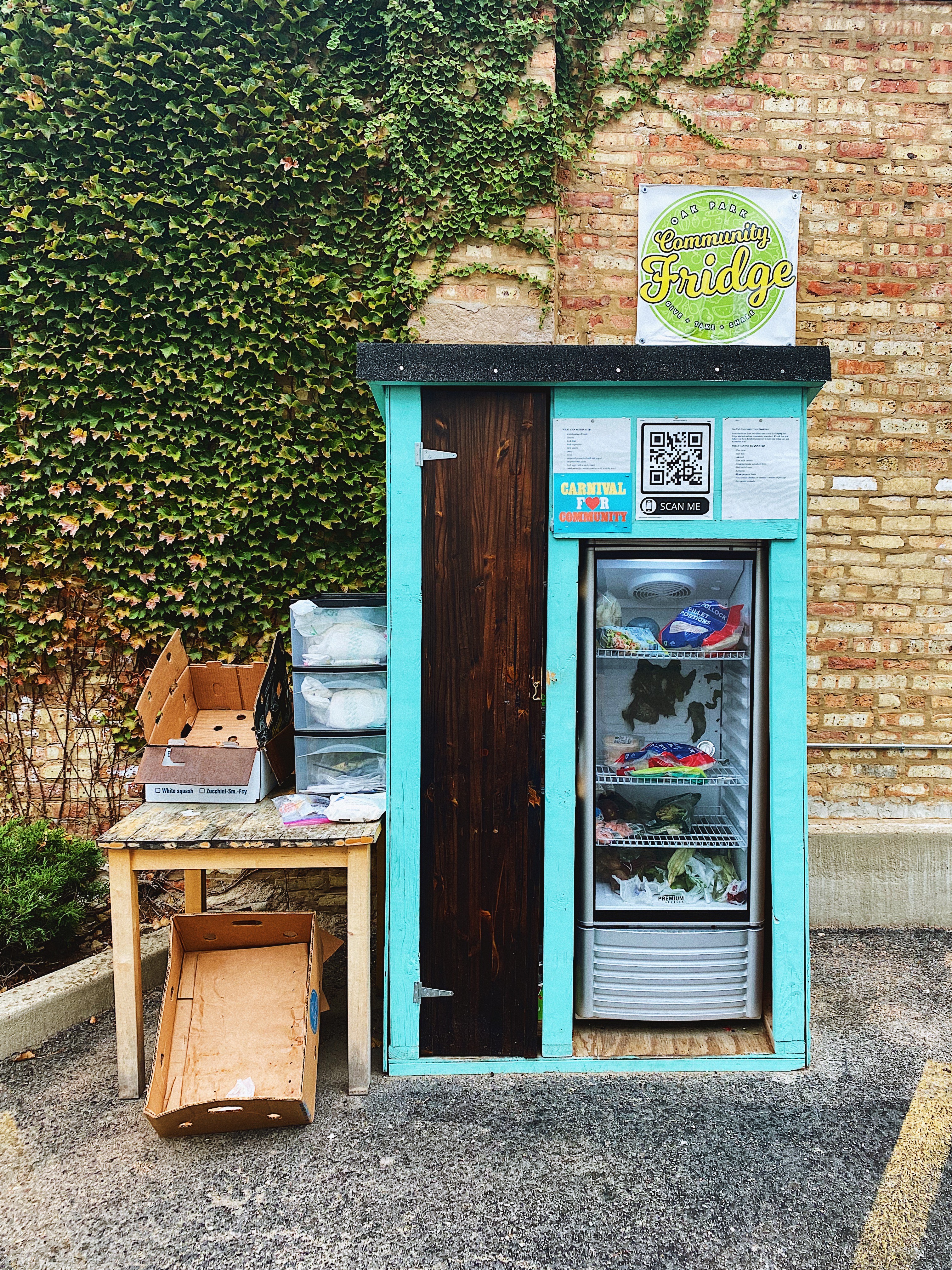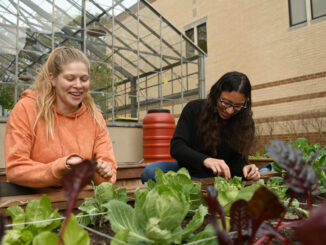
By Emily Ford
Contributing Writer
Six months since it first opened, the Oak Park Community Fridge is making its mark on the Oak Park community. It is feeding some people and simultaneously reminding others of their obligations to help the community.
The fridge sits in the parking lot behind Carnival Grocery at 824 S. Oak Park Ave, and has been linking all sorts of Oak Parkers, according to Carnival manager Arthur Paris. It caters to people who can donate food and to people who need food and can pick it up for free.
“We’ve seen everyone come by and use the fridge,” Paris said last week. “I think a common stereotype for free fridges is that mostly homeless people or those who need financial assistance will exclusively use the fridge; but just about everyone in the neighborhood comes by from time to time.”
“Sometimes delivery guys swing by and grab a snack or people who live on the surrounding street will grab things that they need last minute,” he said.
Activist and teacher Anthony Clark helped set up the Fridge in March, modeling it after the large number of free fridges around the country. Though the free fridges have been around for more than a decade, they experienced a spike in demand during the pandemic. This is also what sparked Clark to partner with Carnival Grocery and install one in the parking lot.
People regularly donate food to the fridge, with many donating extra items when they shop at Carnival.
“When customers finish shopping, they can buy or donate food to specifically request to put in the fridge,” said another Carnival employee. “At the end of the day we will replenish the fridge with all the food that was donated and sometimes employees will choose something from the store as well for the following day.”
Not only do they donate from Carnival Grocery after they finish shopping, people also donate from other grocery stores as well: the fridge also has brands from Whole Foods and Jewel Osco.
“Dairy products, bread and packaged food are the most popular items; they’re easy to grab and go, and they also hold value,” Paris said.
Unlike other fridges in the country, the fridge upholds strict standards to ensure that food is safe and sanitary. For example, raw meat, raw fish, alcohol, raw milk cheeses, unlabeled item, leftovers, home prepared foods, unsealed items, and peanut products are all off-limits for the fridge. This helps regulate safety and the communities over all general health which is often times a challenge to keep under control for free fridges in any location.
It’s better to donate new products or less-perishable products such as sealed package foods, cheeses, fresh fruit, fresh vegetables, table sauces, pastry, bread, unopened pasteurized milk, yogurt or fruit juices, fresh eggs, and cured meats, according to guidelines posted on the fridge.
The fridge is facing its first holiday season, and its first winter. Paris isn’t sure what will happen with supply and demand. One thing he is exploring is getting some funds from the Oak Park village board.
“Regardless of politics or anything, having accessibility to food is a human right and we are trying to help a little by running the fridge,” said Paris.
There isn’t a timeline yet for the appeal to the board, but the fridge will continue to operate, linking those who want help with those who need help.
“Anything we put out gets taken within 24 hours,” Paris said. “We actually don’t have enough resources sometimes to keep it maintained all the time.”
Some people also donate “baby bundles” such as diapers, onesies, wipes, and other expensive childcare products.
But above all, Paris said the fridge helps to build a true sense of community.
“We have seen some really heart-warming moments from the fridge’s presence,” he said. “This past Father’s Day someone was generous enough to leave a huge Whole Foods cake in the fridge and we were all worried that no one was going to take it,”
“Moments later, four men who are locals in the area that hang around the train station grabbed the cake and plastic forks and sat on the bench together and enjoyed the whole thing,” he said. “That was a win to see since that is what the fridge is there for.”
Dr. Sarah Jones, Assistant Professor at Dominican University in the Department of Nutrition Health Sciences, says that healthy and affordable food holds the real standard of what should be a human right.
“Until the agricultural and manufacturing side of the food industry start to believe that food should be healthy and affordable, many people are going to need to rely on food assistance programs such as pantries, SNAP and WIC, and other avenues such as the community fridge,” says Jones.
By highlighting on the weight that free fridges can carry for some in less privileged neighborhoods, she emphasizes on the importance of their implementation.
Here at Dominican, there are similar programs such the DU Feeds Market for students to grab a bag of healthy food on the go, similar to the idea of the community fridge.
“Over the past year, this program has supported many students and even collaborated with the DU Greenhouse,” said Jones. “We are in the process of developing a survey to help us understand who is participating in the program as well as determine its reach.”



